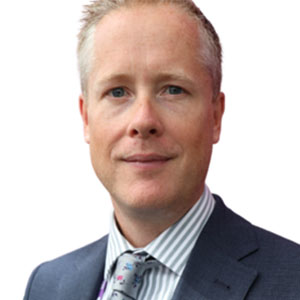Job Title
Chief Medical Officer, Solent NHS Trust
Where are you based?
In hospital, I’ll be in the emergency department or running a clinic. I also spend a lot of time at our offices and medical centres across Hampshire and the Isle of Wight.
Is your role clinical or non-clinical?
Both – I spend one third of my time with patients and two thirds wearing my clinician ‘hat’ in our non-clinical work.
Tell us about your job
I’m responsible for overseeing everything we do medically across Solent NHS Trust, which employs 6,000 people and serves one million patients. I am also Associate Medical Director at University Hospital Southampton, and work there clinically for part of my time.
How did you join the NHS?
I’d always wanted to be a doctor. I followed a pretty traditional route, going to medical school in London, which despite taking six years was also really great fun. I then spent eight years as a junior doctor in Southampton, Portsmouth and the Isle of Wight. During this time, I did a three-year PhD at the University of Southampton. One of my highlights was going to Burma and working at a medical centre on the Thai border where refugees fleeing Burma were being treated. This experience taught me a lot about humanity.
What’s your day to day like?
I have two types of day. My clinical day will start at 8am, catching up on admin before heading down the emergency department. I work with a close team of nurses, doctors, paramedics and therapists and am focused specifically on patients over 80 who arrive at the hospital (I trained as a geriatrician doctor, helping older people). We find out why they are there and what we can best do to help them, ensuring they return safely home if they don’t need further treatment. This will either be a full or half day. If it’s a half day, I will have a clinic in the afternoon, where I specialise in treating patients who have previously collapsed. We work to understand causes, treatments and manage ongoing care where needed.
A non-clinical day starts at our offices at 8am. I’ll have a series of meetings where I’ll have the opportunity to influence and impact the work we do. It’s a really wide breadth – we could be meeting about mental health in Portsmouth, a young persons’ service in Basingstoke, or working on a new service.
What are some challenges?
We’re working in very complex systems, and that can often be a challenge, working to ultimately make changes needed to create the very best for our patients and employees. There is the inevitable challenge of trying to balance money and resources. Another is making sure I use my time effectively. I want to get the best out of the people around me – to inspire and help them.
What do you love about your job?
Without a doubt it’s being with people. Talking together, problem solving, having fun.
What’s your top tip for developing a career in the NHS?
Treat others how you would want to be treated. Be friendly, kind and enthusiastic. Look at the best in every opportunity.
What would you say to a young person thinking of joining the NHS?
Joining the NHS was such a positive decision for me. You’ll always be looked after and will leave work each day knowing you’ve helped people and made a difference. It’s an absolute pleasure and a privilege.

